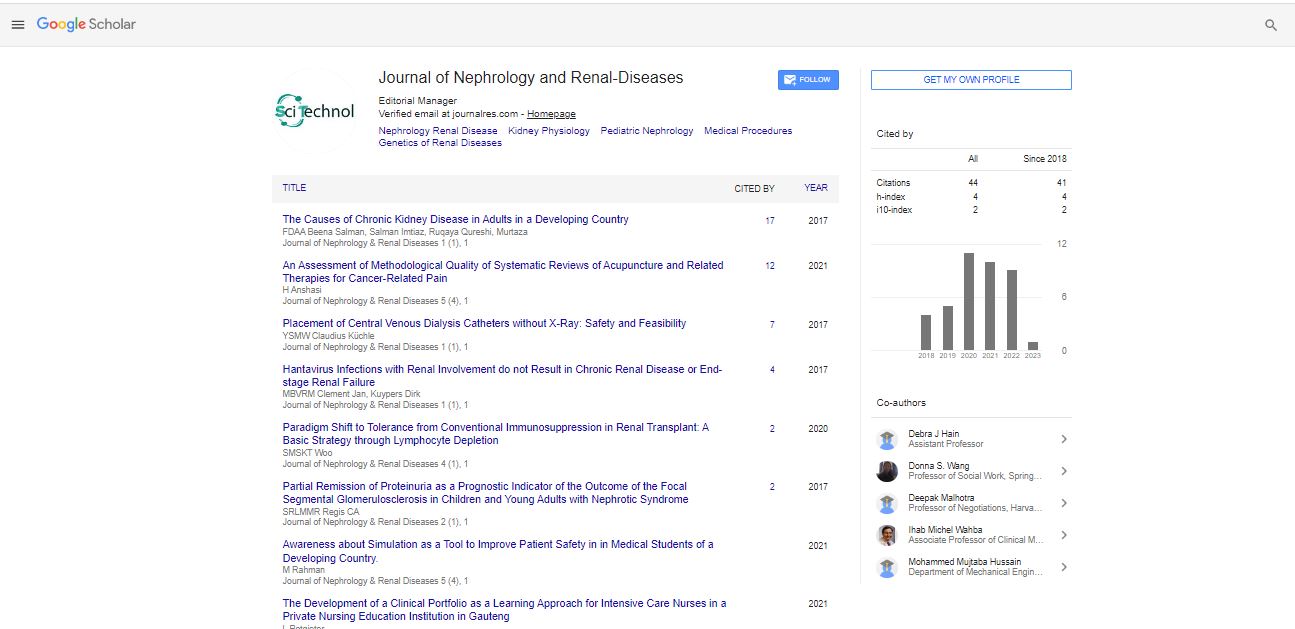Five-year survival of chronic kidney disease stage-5 patients initiated on hemodialysis at age 60 years old and above
Rachell Ann C Siute and Arlene Crisostomo
St. Lukes Medical Center-Quezon City, Philippines
: J Nephrol Ren Dis
Abstract
Objectives: To determine the median survival from time of initiation of hemodialysis among CKD-5 patients aged ≥60 years and to determine: (1) the risk factors for elderly patients on hemodialysis that can affect prognosis, (2) the association between the identified risk factors with mortality on patients initiated at age 60 years and above, and (3) the causes of death on patients initiated at age 60 years and above. Methodology: This is a multi-center cohort study of 194 hemodialysis patients, age 60 years and above, who were initiated from January 2006 to December 2016. Results: The median survival time was 35 months (30-40). The highest number of patients died within 1 year of hemodialysis initiation was 54 (28%). Traditional and non-traditional risk factors, such as presence or absence of diabetes mellitus, hypertension, cerebral disease, cardiovascular disease, malignancy, history of hospitalizations, infections, incidence of falls and/or fractures, monthly laboratory tests were identified and association with prognosis was established through Cox regression analysis. Results of the univariate and multivariate analysis revealed sex (HR 1.59, 0.98-2.59, p =0.060) with males having higher mortality than females, age at the start of dialysis (HR 1.05, 1.01- 1.08, p=0.001) and malignancy (HR 3.63, 1.72-7.65, p=0.001) as significant prognostic factors in elderly patients undergoing hemodialysis. Among the 194 patients, 165 deaths (85%) were recorded as of end of study. The most frequent causes of death were cardiovascular in 65 patients (39.4%) and infectious in 60 patients (36.4%). Conclusion: The median survival time of elderly patients initiated on hemodialysis at age 60 years old and above is 35 months. Although age is no longer considered as a contraindication to initiating hemodialysis, the higher the age of initiating hemodialysis was shown to have an increased risk of 5% for every 1 year increase in age (HR 1.05, 1.01-1.08, p=0.001). Other factors associated with poor prognosis were male sex and presence of malignancy. Significance of Study: As the population continues to age and prevalence of kidney disease increases, clinicians are frequently faced with the decision of whether or not to initiate renal replacement therapy for their patients. Many clinicians believe that age is a barrier for initiation of renal replacement therapy because dialysis in elderly patients has been associated with increased risk of mortality. However, data regarding outcomes of elderly patients undergoing hemodialysis are limited. This present study evaluated the median survival time in hemodialysis patients initiated at ≥60 year old and the factors that affect mortality were also analysed.
Biography
E-mail: Rachael.Lee@uhcw.nhs.uk
 Spanish
Spanish  Chinese
Chinese  Russian
Russian  German
German  French
French  Japanese
Japanese  Portuguese
Portuguese  Hindi
Hindi 
